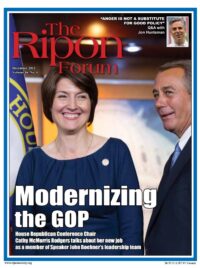
For the last 26 years, I’ve had the privilege of representing the people of Arizona in Congress – and I have learned some important lessons along the way. The Ripon Forum has asked me to share some of these with new senators.
To get things done, you must be able to influence others. Knowledge is power. Those who know the most about an issue – and who present ideas straightforwardly – can be depended upon as reliable resources. I’ve found that knowledge about a certain topic is more important in influencing others than seniority, title, or committee assignment.
Stand tall for principle. The solution to the problem of congressional dysfunction is not to diminish the contest of ideologies or political philosophy, but of partisan politics – and there’s a big difference.
The premise of our system of government is that ideas, when debated fairly and robustly, produce the best policy solutions; thus, contests between strong advocates of liberal and conservative ideologies are the foundation of our governance, and neither side should lightly compromise their principles just for the sake of “getting something done.” Ideologies provide the values and structure for coherent public policy; like a house without a firm foundation, policy not based on coherent and consistent values cannot long endure.
This is not to say that conservatives and liberals shouldn’t compromise. It’s frequently hard, but among people of good will, it can be done. My point is, today’s biggest problem is not ideology, but partisan politics. Whereas there used to be some time after each election when Democrats and Republicans could legislate outside of campaign mode, today’s perpetual election cycle with 24/7 political news coverage means that every major issue ends up being framed in partisan political terms, so neither side can afford to “give.” Gridlock ensues.
I don’t know the solution to this challenge (outside of more courageous political leadership), but I firmly believe that the answer is NOT to promote compromise over legitimate political debate. In sum, legislative battles between liberals and conservatives are healthy; those between partisan “Democrats” and “Republicans” are not.
In sum, legislative battles between liberals and conservatives are healthy; those between partisan “Democrats” and “Republicans” are not.
Be civil. The most successful senators can both stand tall for their philosophies and maintain healthy relationships with members of both parties by arguing their positions reasonably. Some in D.C. have lost the ability to disagree without being disagreeable – and that is unfortunate, because such heated rhetoric often stands in the way of compromise when it might otherwise be achieved.
The Senate is unique – keep it that way. The Senate is not the House, and that’s how it should remain. The Founders deliberately created one chamber to represent the people’s passions (with action governed by majority rule) and the other to serve as a source of more sober reflection (with more respect for the views of the minority). Both roles are essential in our system of checks and balances. Eliminating the filibuster on motions to proceed to a matter, as some have advocated, would deny the minority important leverage to ensure its rights (e.g. to offer amendments of its choosing). That would severely diminish the Senate’s role as a great deliberative body.
Jon Kyl is the junior United States Senator from Arizona and the Senate Minority Whip. He is retiring from the Senate at the end of the 112th Congress after three terms in office.




